This article is more than 5 years old.
Most of my conference activities revolved around the RUSA History Section, for which I’m the outgoing Secretary and incoming Vice Chair/Chair-Elect. In addition to our All-Section Meeting, we held two discussion groups, one for History Librarians and another focused on Local History and Genealogy. I really enjoy this group because there are so many different kinds of libraries represented, and I learned a lot about the different kinds of questions that get asked and the resources that other librarians use in their day to day work. One of the attendees at the LHGDG worked at the US Holocaust Memorial Museum, so I came away with more information about what they make available in terms of genealogy and the challenges they face in that work. I was also able to share about the great work that Rebecca and SCA have done with Hop into History, and one of the librarians I met emailed me after the conference to tell me that his library in Denver, CO loved the idea so much that they are working on creating a similar event there! I attended an orientation for incoming RUSA leadership, which gave me a better understanding of the structure of the organization. We also had an informal breakfast meetup on Monday morning for HS members and had a great turnout!
“National Archives from Anywhere” (RUSA HS sponsored program) [link to recording], Meg Phillips, Lynn Goodsell – The focus of this session was on using the National Archives website to access digitized materials, and how to get materials that aren’t yet digitized. The presenters estimated that only about 5% of NARA’s holdings have been digitized (!) and that there are a large number of records that are born digital but have yet to be processed and made available. Meg opened the session by describing how NARA gets its records from the various branches of government and shared a sample of some of the collections that are available online. A few notable ones: Founders Online, which I have used with American History classes, contains some correspondence and other writing from founding fathers and their families; Center for Legislative Archives has records for Congress as a whole, not individual members; DocsTeach is a resource for educators that has 11,000 selected documents with corresponding lesson plans; and the NARA catalog (which contains about 95% of their holdings) is the place to go to see what they have and how you might be able to get it. Lynn then shared more detail about how to search the catalog, the different kinds of records you might encounter, how they’re organized, and how to request things that aren’t online. I came away feeling like I had a much better idea of what NARA collects and how I can use it in working with students and faculty in both history and social science courses.
When I wasn’t doing RUSA things, I did attend some other sessions and spent some time on the exhibit floor grabbing books for Blind Date with a Book (and a few for myself, too!). A few session highlights:
Readex Breakfast, “Savage Sessions: The Lost History of Colonial Violence in Antebellum America”, Dr. Joanne Freeman [link to recording] – This breakfast is always one of the highlights of ALA for me. Readex always manages to bring in an entertaining speaker on a timely topic, and this year was no different. Dr. Freeman is a Professor of History at Yale, and her talk was based on her recent book, Field of Blood: Violence in Congress and the Road to Civil War. Her book and talk focus on the untold story of the actual physical violence that took place in Congress during the first half of the 19th century. Freeman shared about some of the many sources that used, including Congressional Records, newspapers, the diary of Benjamin Brown French, and letters that Congressmen wrote to their wives. Her original goal was to look at the coming of the Civil War through a different lens, and it was really fascinating to hear her talk about the relationship between the Southerners and Northerners in Congress. Southerners were often known as “fightin’ men”, and their constituents specifically elected men that they knew were not shy about using physical violence to “fight for their rights”. While many Northerners were initially labeled as “non-combatants”, towards the end of the 1850s, even they were becoming more violent; one Congressman was given a gift to take back to DC – a gun inscribed with the words “Free Speech”. Freeman also acknowledged some of the parallels between the partisanship and animosity in our current Congress and the Congress of the 1850s. I really encourage you to watch the recording I linked above if you’re interested!
“Counting on Trust, Trusting the Count: Census 2020” [link to recording], Kenya Flash (moderator), Thomas Saenz, Hansi Lo Wang, Robert Groves – The presenters of this session represented a broad range of expertise on the Census, from Robert Groves, former Director of the Census Bureau (and current Provost at Georgetown) to Hansi Lo Wang, an NPR reporter who covers the Census and related issues, to Thomas Saenz, Presidenad and General Counsel of MALDEF (Mexican American Legal Defense and Educational Fund). Each of them shared a different perspective on the value of the Census and the importance of getting an accurate count. While the citizenship question was a central point of discussion, I also learned a lot in general about the Census and how it is administered. In our current climate of government distrust, they also encouraged librarians, in particular, to be advocates for the Census and shared information on how to prepare for the Census and respond to patrons who express concerns about confidentiality and privacy.
I also have to say that DC is a fantastic location for ALA, and the Convention Center and nearby hotels were so convenient to many of the amazing things that DC has to offer. Like Mary Beth, I also took the chance to visit a few favorite and new museums around DC, including taking advantages of a special tour at the Folger Shakespeare Library and a librarians-only open house at the Library of Congress.
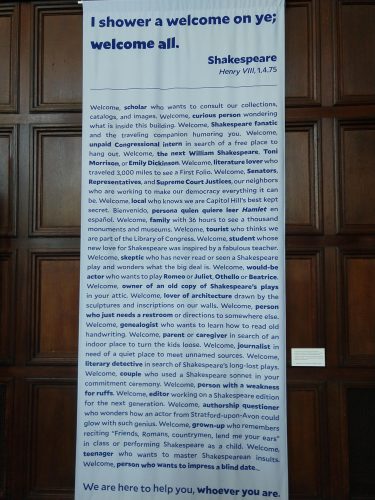
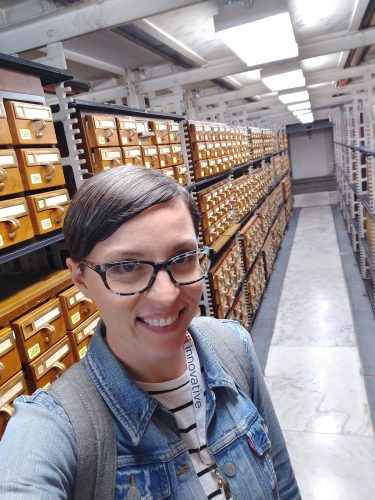
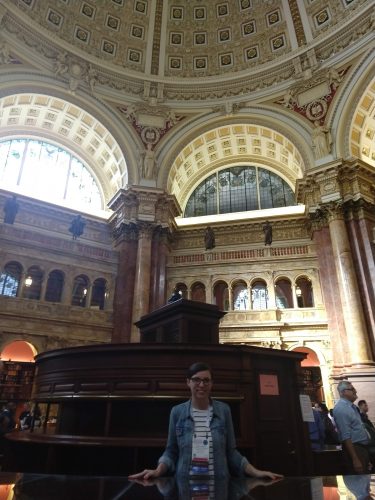
The LOC and the National Archives both had special exhibits to commemorate the centennial of passing of the 19th amendment, and I spent a long time at both trying to soak in all of the information about the incredible women who took part in the suffrage movement.
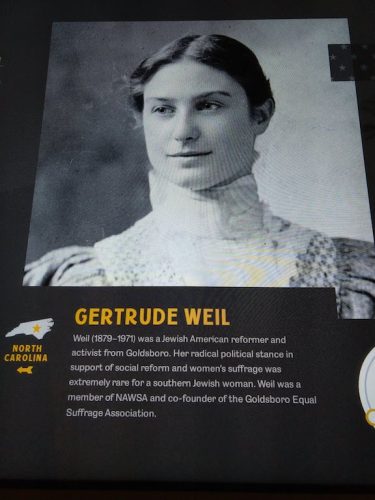
There was also a gem right across the street from the convention center – a former Carnegie library is now both an Apple store and the DC History Center, which recently reopened and had an exhibit of panoramic photos. It recently reopened after a huge renovation, and it is definitely worth a visit!
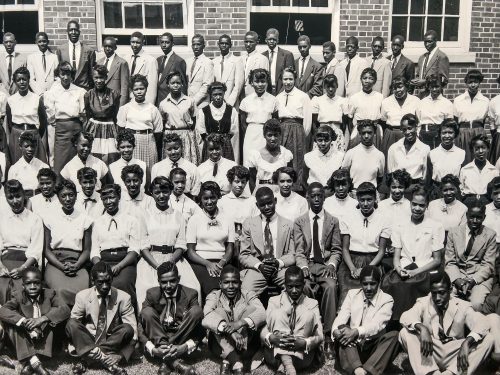
And, thanks to a friend of a friend, I got a little behind-the-scenes look at NPR headquarters and nerded out over seeing Melissa Block’s office (she wasn’t in it, unfortunately).
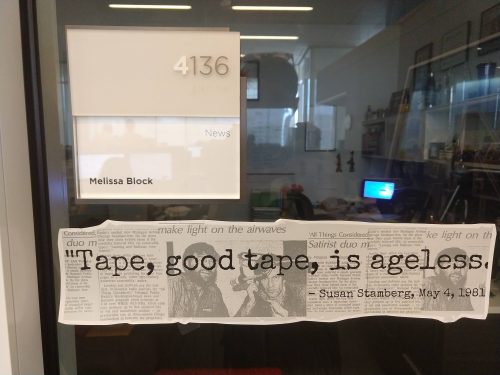
All in all, it was a great ALA and a great opportunity to enjoy all that DC has to offer, and it definitely convinced me that I should not wait another 9 years before my next visit! There are still so many more museums to see…
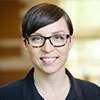
6 Comments on ‘Kathy at ALA Annual 2019’
Thank you for this expansive report! Your sessions sounded fascinating and I will listen to a recording or two. Lucky you to get to NPR!
Thanks for this great summary and the pictures. I have never attended ALA, and this report gave wonderful highlights from the conference. Congrats on being upcoming chair of the the RUSA History section!
Did not expect a session on the Census, what a great way to gather folks on an important and timely topic. Thanks for sharing about your ALA, Kathy!
So many trails I want to follow, so little time, but I sure hope to find an opportunity to listen to the Dr. Freeman recording. I think I once heard that there was some violence in Congress during the Revolutionary period too! Also some media smear campaigns during the Adams / Jefferson contest.
Thanks for the great info and the accompanying pictures! LoC and Susan Stamberg are both awesome. And I was interested to learn about the DC History Center too.
Thank you for sharing your experiences at the conference as well as in D.C. Kathy! Congratulations on being the upcoming Vice Chair/Chair-Elect for RUSA HS!
Wow, you packed a lot into your ALA time! Sounds like it was a great conference. And I love that your promo of SCA’s Hop into History has sparked interest in Colorado! Field trip?! 😉